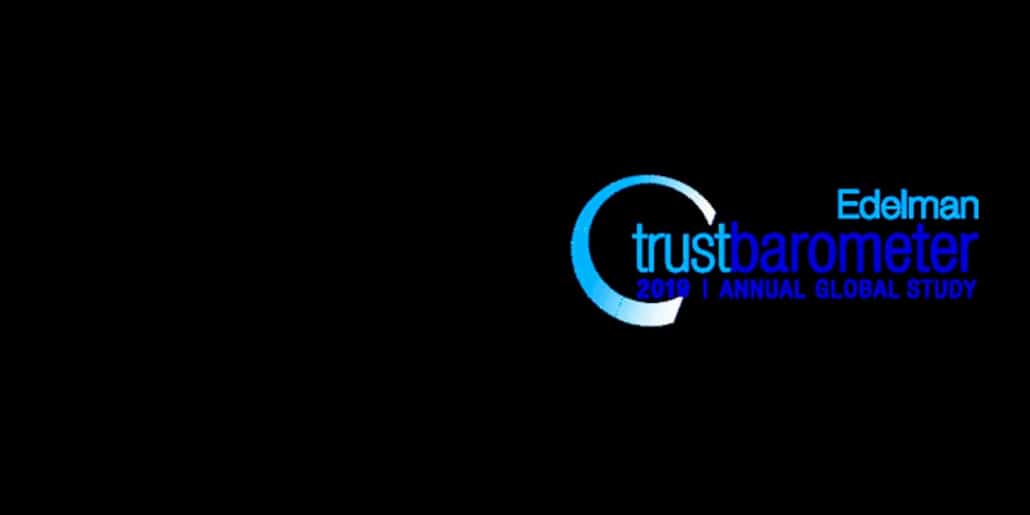The 2019 Edelman Trust Barometer (ETB) reveals that trust levels have changed significantly in the past year. The ETB measures levels of trust in four main institutions – business, the government, media, and NGOs – in 27 countries around the world. A further 15 sectors, ranging from entertainment and automotive to energy and financial services, are also surveyed.
Respondents are asked how much they trust the four main institutions to do what is right. It polls two broad population groups for their levels of trust: the informed public – those meeting the criteria of age 25-64, college educated, in the top 25% of household income, and having high engagement with media – and the mass population, who represent the vast majority of the global population, or 84%.
Levels of trust are determined on a scale from 0% (least trusting) to 100% (most trusting), and are placed into three bands – distrustful, neutral, and trusting.
The report is published by communications and public relations group Edelman.
With a focus in 2019 on the employer-employee relationship, Edelman found that globally, ‘my employer’ (75%) is far more trusted than NGOs (57%), business (56%), government (48%) and media (47%).
China is once again at the top of the overall trust index with both groups, while Russia is at the bottom.
Trust gap widens
This year, the gap in trust between the informed and mass populations has opened to its widest ever, at 16 points. Edelman attributes this to jumps in trust amongst the informed, while the mass population’s trust levels remained relatively flat. The gap is severe in developed nations, Edelman notes (UK – 24 percentage points; Canada – 20 points; France – 18 points; US – 13 points) and has now moved into the developing world (India – 17 points; China – 12 points).
Gender also contributes to the trust gap, and this can be seen in the large gender trust gap in several developed markets, such as Germany (12 points) and the US (11 points), mostly driven by women’s lower trust in business. Globally, the average trust percentages for women and men are 50 and 55 respectively.
In terms of the two groups of respondents, overall South Africa’s informed public is more trusting at 53%, with the mass population at 45%. China tops the list with both groups (79% and 88% respectively). Globally, the average is 63% for the informed public and 52% for the general population.
Angel Gurría, secretary-general of the OECD, remarked at the time of the ETB’s release: “At the OECD, we see immense opportunities for the public sector to regain citizens’ trust. It requires investing in good public governance and moving towards a more inclusive society.”
Employers must also work towards change
CEOs are expected to lead the fight for change. More than 75% of respondents say they want CEOs to take the lead on change instead of waiting for government to impose it, and 71% of employees believe it’s critically important for ‘my CEO’ to respond to challenging times.
Such activism will yield rewards – 73% believe a company can take actions that both increase profits and improve economic and social conditions in the community where it operates.
Employees expect prospective employers to actively join them in advocating for social issues (67%). Companies that do are rewarded with greater commitment (83%), advocacy (78%) and loyalty (74%) from their employees.
Governments distrusted globally
Globally, the general population showed the least trust in governments at 47%, while the informed public are somewhat more trusting, at 58%. South Africa has never put in a good showing in this category, having debuted on the ETB in 2014 with an unimpressive 17% of respondents saying they trusted the government.
Things have not improved since those days. In 2016 the government’s trust rating slipped to 16% – making the South African government the least trusted of those polled.
In 2017 that already meagre percentage dropped to 15% and in 2018 it was 14%, far below the global average of 43%. In 2019 South Africa’s government is once again the least trusted of all countries polled – just 21% of respondents trust the government to do the right thing. This is a seven-point increase from last year, but not enough to lift South Africa out of last place. The global average is 47%.
The most trusted government in 2018 was that of China, with 84%. This year China’s government has again topped the list, at 86%, followed by the UAE at 82% and Indonesia at 75%.
Other institutions
South Africans are highly trusting of NGOs, at 60%. This narrowly lifts South Africa out of the ‘neutral’ band and into the ‘trusting’ band.
In terms of business, South Africa falls into the neutral category, at 58%, and it is firmly untrusting of media, at 41%.
However, South Africa is not alone in this situation. “The last decade has seen a loss of faith in traditional authority figures and institutions,” said Richard Edelman, president and CEO of Edelman. “More recently, people have lost confidence in the social platforms that fostered peer-to-peer trust. These forces have led people to shift their trust to the relationships within their control, most notably their employers.”
Fake news still a concern
In 2018 NGOs were the most trusted institution, at an average of 53%, and media was the least trusted, at 43%. This year is no different, with NGOs trusted by 57% and media by just 47%, while trust in business and government stands at 56% and 48% respectively.
In terms of the specific types of media, traditional media and search engines are most trusted (65% each), the highest historical ever levels for each, and driven by large increases in developed markets. Conversely, social media is the least trusted (43%), especially in several developed regions that show enormous trust gaps between traditional and social media (U.S./Canada, 31-point gap; Europe, 26-point gap).

